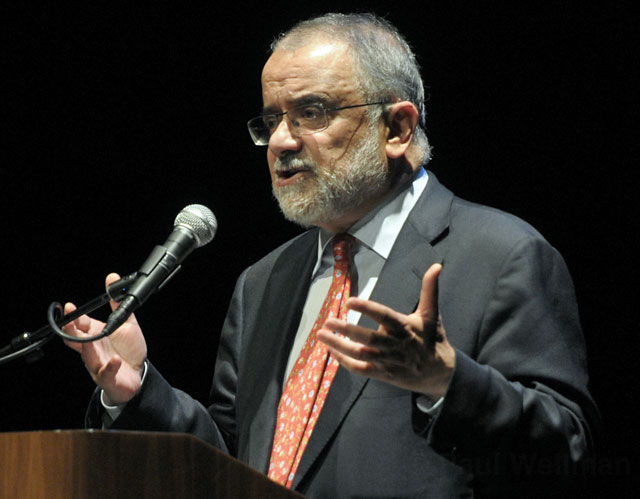Determined For a Negotiated Peace
Pakistani Journalist Ahmed Rashid Explains the Necessity of Settlement in Afghanistan

Ahmed Rashid’s lecture last Monday at UCSB’s Campbell Hall was not only sharply insightful, but also timely. It was about America’s well-known difficulties in Afghanistan, and it came on the eve of President Barack Obama’s unannounced flight to the Bagram air base in Kabul, where he — along with Afghani president Hamid Karzai — signed the Strategic Partnership Agreement amidst tight security and secrecy. The contract between the two nations aims to fortify aid the U.S. has provided Afghanistan for the last decade. Rashid, speaking expertly about the region’s current political nuances, stressed the importance of such support for the sustenance of a free and stable Afghanistan.
“The U.S. must end the war before it leaves,” Rashid stated. “It must end with a peaceful, negotiated settlement — one that is reasonably compromising and agreeable to all.” If not, he said, the Afghani government will not survive the ambitions of the Taliban. And Afghanistan, Rashid pointed out, threatens to collapse not just from lack of security, but also from the absence of a functioning economy and an accountable civilian infrastructure.
“Over the last ten years, the U.S. has invested over $600 billion dollars in restoring Aghani society,” Rashid said, “and yet, once NATO and the U.S. pull out, most of the democratic and educated citizens employed will lose their jobs.” Regrettably, any semblance of a working Afghan economy currently relies on occupying sources of aid. This is also partially true of government administration with its executive, legislative, and judicial functions being carried out by both international and Afghani officials. For the U.S. exit not to have devastating consequences for Afghanistan’s future, the political problem — the deceptions and disagreements between the governments of Afghanistan, Pakistan, and the authoritative elements of the Taliban — must be resolved, Rashid said.
This begins with honest and open talks with the Taliban, engaging in power-sharing measures, prisoner exchange, and other confidence-building gestures, he explained. “This all needs to take place on an Afghan timeline, not on a U.S. timeline. We cannot afford a protracted settlement period due to U.S. politics,” said Rashid.
All parties to this struggle — the Taliban included — are wary of brutal civil war breaking out in the event of a chaotic power-vacuum that will ensue if a well-negotiated settlement is not reached, Rashid went on. The Taliban know they will be shunned internationally, Rashid noted, if they come to power without first partnering with Karzai — only then could they leave their sanctuaries in Pakistan and return as legitimate governors to Afghanistan.
Rashid concluded saying that only democracy can allow civil structure to flourish. And for this to happen, the U.S. must see to it that they “leave honorably and with good faith,” resolving the political instability that they’ve helped to exacerbate in surrounding conflicts, mostly notably with Iraq.
The problems facing Afghanistan, Pakistan, and the U.S.’s relationship with the Middle East receive a penetrating and illuminating discussion in Rashid’s recently published book on the subject, Pakistan on the Brink: The Future of America, Pakistan, and Afghanistan.


